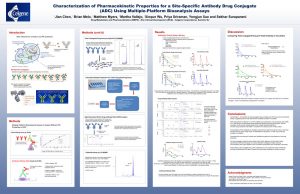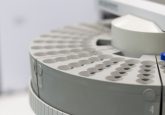10th WRIB Poster Award winner: Jian Chen

The Bioanalysis Zone and Bioanalysis team attended this year’s 10th Workshop on Recent Issues in Bioanalysis (WRIB; FL, USA), 18–22 April 2016. As usual the event had a host of excellent talks by leadingexperts in all aspects of bioanalysis, with sessions on small molecules, large molecules, biomarkers, LBA, LC–MS and immunogenicity, plus a full program of training workshops and discussions for the forthcoming White Paper.
We were particularly proud to support the WRIB Poster Award, presented by our journal Editor Sankeetha Nadarajah to Yang Xu, Shaifali Gupta and Jian Chen. Here, we feature the winning poster from Jian Chen, as well as an exclusive interview.
Click here to view the poster, or click on the image below.
Interview with Jian Chen (Celgene)
 Jian Chen is currently a Principal Scientist working in DMPK group at Celgene. He joined Celgene in 2009 and has been responsible for supporting Celgene bioanlytical studies both in-house and at bioanalytical CROs. Jian represents bioanalytical function for several development programs in various cross-function study teams including both non-clinical and clinical studies. He is also engaged in many bioanalytical research projects conducted at DMPK labs. Jian’s interests include microsampling techniques, bioanalytical methods for quantitation/qualification of biomarkers, protein therapeutics, antibody-drug conjugates and oligonucleotides using various LC/MS/MS platforms. Prior to joining Celgene, he worked as a Research Scientist at Tandem Labs, a bioanalytical CRO where he gained experiences in bioanalytical method development and validation, supported both regulated and discovery bioanalytical studies.
Jian Chen is currently a Principal Scientist working in DMPK group at Celgene. He joined Celgene in 2009 and has been responsible for supporting Celgene bioanlytical studies both in-house and at bioanalytical CROs. Jian represents bioanalytical function for several development programs in various cross-function study teams including both non-clinical and clinical studies. He is also engaged in many bioanalytical research projects conducted at DMPK labs. Jian’s interests include microsampling techniques, bioanalytical methods for quantitation/qualification of biomarkers, protein therapeutics, antibody-drug conjugates and oligonucleotides using various LC/MS/MS platforms. Prior to joining Celgene, he worked as a Research Scientist at Tandem Labs, a bioanalytical CRO where he gained experiences in bioanalytical method development and validation, supported both regulated and discovery bioanalytical studies.
What is your role at Celgene Corporation?
I am currently working in Celgene’s DMPK group as Principal Scientist. I support various Celgene bioanalytical studies both in-house and at CROs, and represent bioanalytical functions on cross-function study teams. I am also actively involved in bioanalytical research from microsampling techniques to quantitation of biomarkers, protein therapeutics, antibody-drug conjugates and oligonucleotides on various LC/MS platforms.
What were your first thoughts on winning the 10th WRIB Poster Award?
I was quite surprised, but it is a great honor for our poster to be recognized by our peers. We also appreciate the opportunity to present our ADC research during the 10th WRIB and share our lessons learned with the with the bioanalytical community. Celgene has grown a lot in the past few years but our bioanalytical group still very small compared to many other Pharma companies; so I felt very fortunate to work with such a group of highly innovative scientists. The award validated the tremendous efforts/contributions each coauthor made to this research and to our overall ADC program.
How did you carry out the work highlighted in this poster?
This is truly a team effort with five lab scientists working on five unique bioanalytical assays simultaneously. We started with literature research and brainstorm sessions between our LBA and MS colleagues on how to approach these assays needed to support the ADC program, followed by recurring meetings to discuss technical challenges and potential resolutions. Everyone enjoyed the learning experience, but more importantly, by overcoming these technical challenges, we were able to deliver valuable data to the study team with very tight timelines.
What were the key findings from this research
A unique aspect of this research was the quantitation of total conjugated drug in serum samples by hybrid immunocapture and quantitative tryptic digestion to release playload+linker+peptide surrogate. With precursor/product scans of digested neat ADC sample, we were able to accurately predict the mass/charge states of the surrogate, and use such information to optimized MS parameters. We characterized the linker stability for the ADC during in vivo circulation both through comparing total antibody/total conjugated antibody results and direct DAR measurement using HR-MS. We also identified ADA via difference between LBA and hybrid assays and provided ADA analysis as needed.
What are you looking forward to working on over the next year?
We will apply the key learnings gained from this research to other ADC programs. We will also incorporate more HR-MS based assays to further characterize ADC properties in circulation such as metabolism/catabolism.
Financial & competing interests disclosure
J Chen (and all authors who worked on the poster) are Celgene employees, the materials are from the company and experiments were are all conducted the laboratory at Celgene. The authors have no other relevant affiliations or financial involvement with any organization or entity with a financial interest in or financial conflict with the subject matter or materials discussed in the manuscript apart from those disclosed.
No writing assistance was utilized in the production of this manuscript.
View posters and interviews from the other award winners here.






